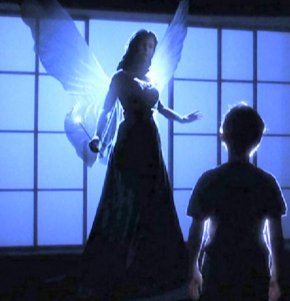 In his May 8th “Big Picture” column for The Los Angeles Times, Patrick Goldstein poses the question that’s been bugging me for years: “Is there anyone besides me who is depressed by the news that Steven Spielberg, a great filmmaker with the clout to get any project he wants off the ground, is going to make… Indiana Jones 4?”
In his May 8th “Big Picture” column for The Los Angeles Times, Patrick Goldstein poses the question that’s been bugging me for years: “Is there anyone besides me who is depressed by the news that Steven Spielberg, a great filmmaker with the clout to get any project he wants off the ground, is going to make… Indiana Jones 4?”
In broaching the subject, Goldstein knows he’s not the only one harboring a supreme lack of enthusiasm for Spielberg’s return to the adventuring archaeologist sandbox. But I think I know why one of our greatest living directors – probably the greatest – is capitulating to the demands of the marketplace (i.e. if you believe there is a fervent demand for a fourth Indiana Jones movie nearly twenty years after the fun, if uninspired Last Crusade): his next two projects, Lincoln and Interstellar* will likely be large in scale and short on return. Most importantly, if his progression as a filmmaker is any indication, they’ll also impart less than comforting ideas regarding our brief existence in this cold, godless universe.
This was Stanley Kubrick’s final gift to cinema: he forced Spielberg to confront his own mortality. Though AI remains a wonderfully reliable debate/melee/knife-fight starter, one cannot (or should not if they know how to read a film) argue that its fourth act is some kind of consoling pat on the back to humanity. Though it felt like Spielberg was reverting to his worst sentimental impulses, he was cynically subverting them; David’s perfect day with his briefly resurrected mother is a wish granted by a group of highly advanced mechas who don’t know what to do with this love-obsessed relic of the human age. David is a child in perpetuity who will forever desire to be at his mother’s side; ergo, he’s switched off after reveling in his manufactured moment.
All has not been well in Spielberg’s world since AI: Minority Report argued for the necessity of a world with murder, Catch Me If You Can was a delightful jaunt about a young man finding a father in the federal government, The Terminal was a misconceived fumble with 9/11, War of the Worlds featured a loving father committing murder to ensure his child’s safety, and Munich‘s final shot slammed home the 220-story cost of engaging in morally-motivated violence. These movies are all entertaining in their way, and most of them were box-office hits (only The Terminal and Munich failed to cross the $100 million mark), but it’s been a long time since you could leave a Spielberg movie and feel good about much of anything. Yeah, Tom Cruise gets his son back in War of the Worlds (an earned reward for realizing his daughter needed him more even though, in Dakota Fanning, she has the self-possession of a thirty-three-year-old), but it’s hard to walk out of the theater merrily whistling over “the toll of a billion deaths”.
Before The Terminal, Spielberg’s last artistic failure was Hook, in which he attempted to straddle the divide of childhood and fatherhood (you might be reading more about this movie in a certain ongoing feature on this site). Spielberg’s unfettered optimism cast way too much light on the piece’s darker elements (though the director received a rash of resentment for not dispatching a kid in Jurassic Park, he should get a little credit for killing Rufio in Hook); clearly, he wasn’t ready to shake off his forged-in-the-fifties belief that the world, for all its faults, is a rather wonderful place.
That began to change in 2001. Eventually, incrementally (per Walker Percy), the wonder seeps out of our lives, and I’m pretty sure Spielberg’s once-considerable reserves are being steadily depleted. Though he’ll always have enough stored up to indulge his joy of visual storytelling (I hope!), his worldview is no longer the source of assuagement it was during the Reagan era. This is why, unless he’s going to pull off the greatest feat of thematic smuggling in film history (and if anyone can do it, I guess it’s Spielberg), Indiana Jones 4 seems out of place in his late career oeuvre. It’s as if he feels guilty for being such a Cassandra this decade and wants to give the world one last thrill ride bereft of tangible gloom and doom. This is a kind gesture (Spielberg’s always been a mensch that way), but I’m afraid the film is going to have the opposite effect: at best, it’ll be a forgettably entertaining curtain call; at worst, it’ll be like watching Willie Mays take labored cuts at an old timer’s game – and getting beaned.
You’ve put away your childish things, Steven; there’s no need to unpack them for our benefit. The balance has come due for your profitable flights of escapism: it is the toll of a billion tickets sold.
*A collaboration with big-brained astrophysicist Kip Thorne that can’t get made soon enough.